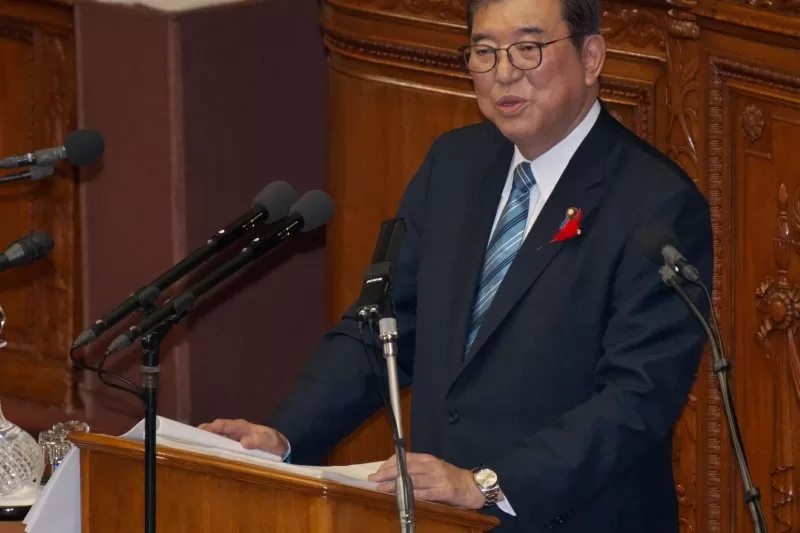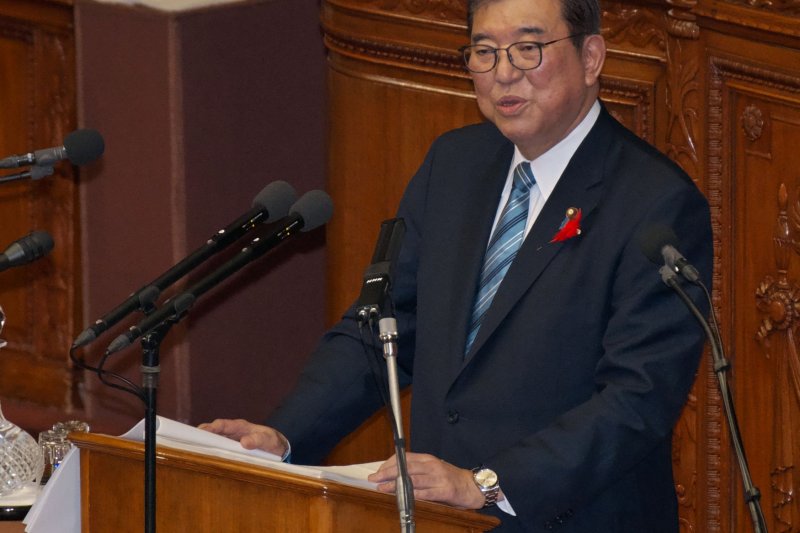1 of 3 | “The objective of this election is to gain public approval of our efforts to fundamentally change the direction of Japanese society,” the new Japanese prime minister said Wednesday. Photo by Keizo Mori/UPI |
License PhotoOct. 9 (UPI) — The new Japanese prime minister on Wednesday dissolved the Diet’s lower House now setting the stage for a general election in a few short weeks as the Liberal Democratic Party clings to power.
Also on Wednesday, the ruling LDP withdrew its 12 official endorsements of lawmakers who had been implicated in a political financial scandal that has drawn the attention of the Japanese public.
The announcement that Prime Minister Shigero Ishiba was dissolving Japan’s 465-member House of Representatives sets an Oct. 27 date for a snap election with hopes Ishiba’s ruling but scandal-plagued Liberal Democratic Party will stay in power.
“The objective of this election is to gain public approval of our efforts to fundamentally change the direction of Japanese society,” Ishiba said Wednesday at a news conference.
A special cabinet meeting is expected to take place later on Wednesday at the prime minister’s office in Tokyo. And official campaign activities will begin next week on Oct. 15, according to reports.
The Japanese Diet officially elected Ishiba on Oct. 1 as the nation’s 102nd prime minister in a 291-461 parliamentary vote.
The dissolution of its lower legislative body, meanwhile, was the fastest in post-war World War II Japan.
Ishiba, 67, replaced former Prime Minister Fumio Kishida, stepped down in August after less than three years as Japan’s head of government.
A dissolution and general election call is a last-ditch effort to secure LDP’s legislative majority and shore up public confidence in Ishiba’s ruling party to govern in its powerful lower House.
Ishiba’s governing coalition needs to reach a threshold of 233 out of a total 465 seats in parliament. The coalition holds more than 280 seats. The opposition, Japan’s Constitutional Democratic Party, holds nearly 100.
Kishiba was elected to the LDP presidency at the end of September in a 215-194 run-off vote after he beat the right-leaning Sanae Takiachi, who was campaigning to be the first woman the lead the Japanese people.
Earlier on Wednesday the LDP unveiled its 279 candidates the party will back for the Oct. 27 election. Among the 12 non-endorsed candidates for the House seats include Ichiro Kanke and LDP’s ex-policy chief Koichi Hagiuda.
But according to a senior LDP official, if non-endorsed members run as independents, the Liberal Democratic Party will not pit candidates against them.
The prime minister expressed his confidence that LDP, along with junior coalition party Komeito, would be able to win and hold its majority in the pending election.
A new cabinet was selected by Ishiba last week. However, it enjoys a roughly 50% approval rating with the Japanese public in contrast to past prime ministers as a sign Ishiba’s struggling LDP still has work ahead of them to keep the voters’ confidence.
Ishiba pledged to appoint a cabinet made up of LDP members who would exercise responsibility “appropriately.” He also acknowledged the imperative of seeking a mandate from voters through a general election “as soon as possible.”
On Wednesday, the opposing CDPJ’s leader was critical of Ishiba’s decision to dissolve the chamber and accused him of trying to divert attention from the ongoing scandal.
The fallout from the 2022 assassination of former Prime Minister Shinzo Abe and legacy party corruption scandals involving secret slush funds forced Ishiba’s predecessor to fire four cabinet members and a series of arrests took place.
“You are dissolving the house early,” Yoshihiko Noda, a former prime minister and the CDPJ chief, said to Ishiba on the floor during Wednesday’s discussions, so that Ishiba’s LDP “can secure a victory during the honeymoon period,” Noda, 67, referenced on periods where new leaders historically enjoy higher public support.
According to reports, Ishiba previously said during party elections that he would dissolve the body and call for elections but only after opposition lawmakers had enough time to question his agenda.
“You said you would not dissolve the (Lower House) immediately and that you wanted to hold a budget committee meeting to discuss domestic and foreign issues,” Nobuyuki Baba, leader of Japan’s Innovation Party, said Wednesday on the floor.
“You said many things, such as creating an Asian version of NATO,” Baba said. “But as soon as you became prime minister, these things dissipated.”
Ishiba favors a NATO-style collective security alliance for the region amid rising tensions between China and Taiwan. He has said he would seek to overhaul the U.S-Japan alliance with regard to the status of U.S. military forces in Japan.
Still LDP’s president, Ishiba also supports historical reforms that would allow a woman to sit on Japan’s ancient Chrysanthemum throne as empress in the Asian island nation which has never had a direct female head of state. The move has long been opposed by successive governments and many in his party.

